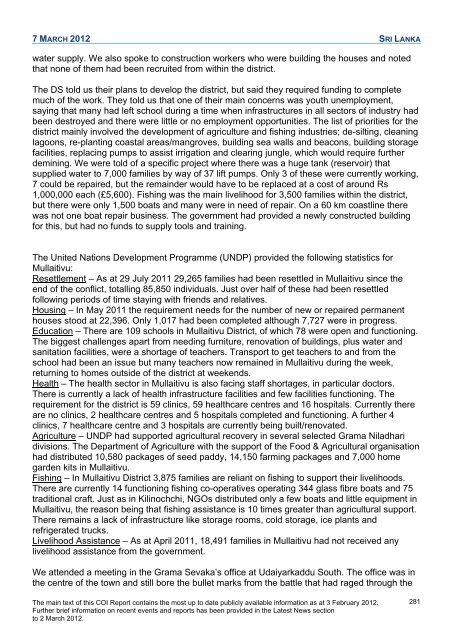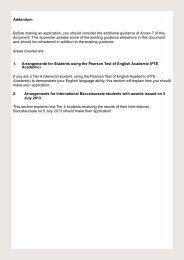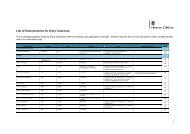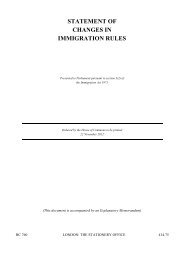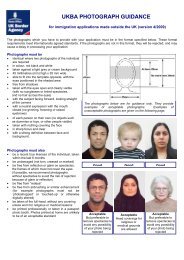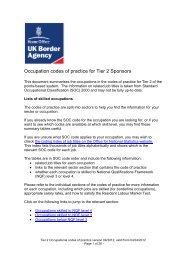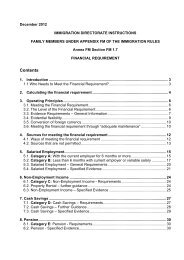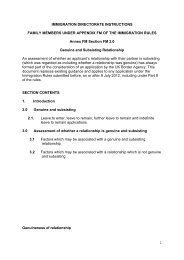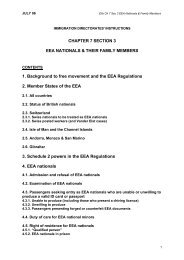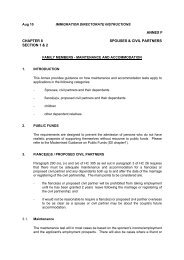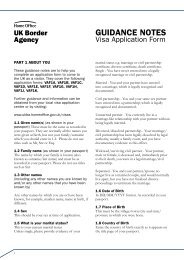COI Report March 2012 - UK Border Agency - Home Office
COI Report March 2012 - UK Border Agency - Home Office
COI Report March 2012 - UK Border Agency - Home Office
Create successful ePaper yourself
Turn your PDF publications into a flip-book with our unique Google optimized e-Paper software.
7 MARCH <strong>2012</strong> SRI LANKA<br />
water supply. We also spoke to construction workers who were building the houses and noted<br />
that none of them had been recruited from within the district.<br />
The DS told us their plans to develop the district, but said they required funding to complete<br />
much of the work. They told us that one of their main concerns was youth unemployment,<br />
saying that many had left school during a time when infrastructures in all sectors of industry had<br />
been destroyed and there were little or no employment opportunities. The list of priorities for the<br />
district mainly involved the development of agriculture and fishing industries; de-silting, cleaning<br />
lagoons, re-planting coastal areas/mangroves, building sea walls and beacons, building storage<br />
facilities, replacing pumps to assist irrigation and clearing jungle, which would require further<br />
demining. We were told of a specific project where there was a huge tank (reservoir) that<br />
supplied water to 7,000 families by way of 37 lift pumps. Only 3 of these were currently working,<br />
7 could be repaired, but the remainder would have to be replaced at a cost of around Rs<br />
1,000,000 each (£5,600). Fishing was the main livelihood for 3,500 families within the district,<br />
but there were only 1,500 boats and many were in need of repair. On a 60 km coastline there<br />
was not one boat repair business. The government had provided a newly constructed building<br />
for this, but had no funds to supply tools and training.<br />
The United Nations Development Programme (UNDP) provided the following statistics for<br />
Mullaitivu:<br />
Resettlement – As at 29 July 2011 29,265 families had been resettled in Mullaitivu since the<br />
end of the conflict, totalling 85,850 individuals. Just over half of these had been resettled<br />
following periods of time staying with friends and relatives.<br />
Housing – In May 2011 the requirement needs for the number of new or repaired permanent<br />
houses stood at 22,396. Only 1,017 had been completed although 7,727 were in progress.<br />
Education – There are 109 schools in Mullaitivu District, of which 78 were open and functioning.<br />
The biggest challenges apart from needing furniture, renovation of buildings, plus water and<br />
sanitation facilities, were a shortage of teachers. Transport to get teachers to and from the<br />
school had been an issue but many teachers now remained in Mullaitivu during the week,<br />
returning to homes outside of the district at weekends.<br />
Health – The health sector in Mullaitivu is also facing staff shortages, in particular doctors.<br />
There is currently a lack of health infrastructure facilities and few facilities functioning. The<br />
requirement for the district is 59 clinics, 59 healthcare centres and 16 hospitals. Currently there<br />
are no clinics, 2 healthcare centres and 5 hospitals completed and functioning. A further 4<br />
clinics, 7 healthcare centre and 3 hospitals are currently being built/renovated.<br />
Agriculture – UNDP had supported agricultural recovery in several selected Grama Niladhari<br />
divisions. The Department of Agriculture with the support of the Food & Agricultural organisation<br />
had distributed 10,580 packages of seed paddy, 14,150 farming packages and 7,000 home<br />
garden kits in Mullaitivu.<br />
Fishing – In Mullaitivu District 3,875 families are reliant on fishing to support their livelihoods.<br />
There are currently 14 functioning fishing co-operatives operating 344 glass fibre boats and 75<br />
traditional craft. Just as in Kilinochchi, NGOs distributed only a few boats and little equipment in<br />
Mullaitivu, the reason being that fishing assistance is 10 times greater than agricultural support.<br />
There remains a lack of infrastructure like storage rooms, cold storage, ice plants and<br />
refrigerated trucks.<br />
Livelihood Assistance – As at April 2011, 18,491 families in Mullaitivu had not received any<br />
livelihood assistance from the government.<br />
We attended a meeting in the Grama Sevaka‘s office at Udaiyarkaddu South. The office was in<br />
the centre of the town and still bore the bullet marks from the battle that had raged through the<br />
The main text of this <strong>COI</strong> <strong>Report</strong> contains the most up to date publicly available information as at 3 February <strong>2012</strong>.<br />
Further brief information on recent events and reports has been provided in the Latest News section<br />
to 2 <strong>March</strong> <strong>2012</strong>.<br />
281


